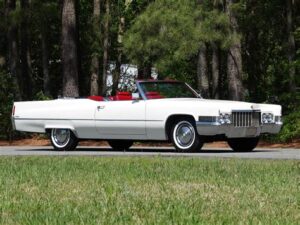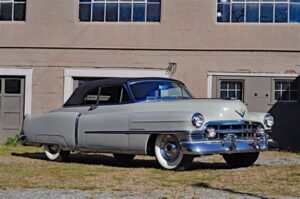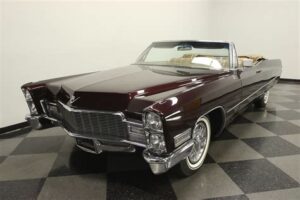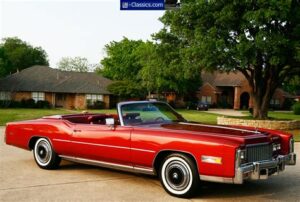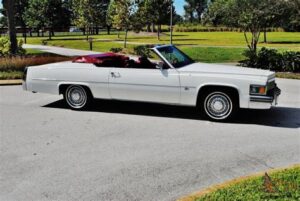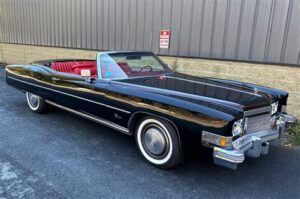Discover everything about Cadillac converters, including their functions, signs of failure, causes of damage, and maintenance tips to ensure optimal performance.Welcome to our deep dive into a crucial component of your vehicle’s exhaust system—the Cadillac converter. This often overlooked part plays a vital role in reducing harmful emissions and ensuring your car runs efficiently. In this blog post, we’ll explore what a Cadillac converter is and its essential functions in maintaining environmental standards. We’ll also discuss the signs that indicate your converter might be failing, common causes of damage, and most importantly, how you can maintain this crucial component to enhance your vehicle’s longevity. Whether you’re a seasoned car enthusiast or a casual driver, understanding your Cadillac converter can help you keep your vehicle running smoothly and responsibly. Let’s get started!
What is a Cadillac converter?
A catalytic converter, often referred to in slang as a Cadillac converter, is a crucial component of an automobile’s exhaust system. Its primary function is to transform harmful pollutants produced during the combustion process into less harmful emissions before they exit the vehicle through the exhaust pipe.
Typically made of precious metals such as platinum, palladium, and rhodium, the catalytic converter plays a pivotal role in reducing the levels of carbon monoxide, nitrogen oxides, and unburned hydrocarbons—substances that can significantly harm the environment and human health. By facilitating chemical reactions within the converter, these harmful substances are converted into carbon dioxide, nitrogen, and water vapor, which are less harmful.
The catalytic converter is strategically placed under the vehicle, ideally situated to optimize its exposure to the exhaust gases emanating from the engine. Without this important component, not only would vehicles be less eco-friendly, but they would also fail to meet emission regulations set by governmental agencies.
Functions of a Cadillac converter
A catalytic converter is an essential component of modern automobile exhaust systems. Its primary functions are to reduce harmful emissions and improve air quality by converting toxic gases produced during combustion into less harmful substances. Here are some of the key functions of a catalytic converter:
- Reduction of Emissions: The catalytic converter plays a crucial role in transforming harmful gases such as carbon monoxide (CO), hydrocarbons (HC), and nitrogen oxides (NOx) into less harmful emissions like nitrogen (N2), carbon dioxide (CO2), and water vapor (H2O).
- Improving Fuel Efficiency: By ensuring that the engine runs more efficiently and cleanly, a well-functioning catalytic converter can contribute to better fuel economy, leading to fewer trips to the gas station.
- Enhancing Engine Performance: A functional catalytic converter allows the engine to perform optimally by maintaining the balance of exhaust gases, which can result in better acceleration and overall driving experience.
In addition to these primary functions, the catalytic converter also helps vehicles meet stringent environmental regulations and standards set by various governments. It is a vital component in the fight against air pollution and is instrumental in contributing to a healthier environment.
Ultimately, the catalytic converter not only reflects the advancements in automotive technology but also underscores the importance of environmental responsibility in today’s world. Ensuring that this component is in good working condition is essential for both the efficiency of your vehicle and the well-being of our planet.
Regular maintenance and timely repairs will help extend the lifespan of your catalytic converter, thus preserving its crucial functions for years to come. Understanding these functions allows vehicle owners to appr
Signs of a failing Cadillac converter
A failing Cadillac converter can lead to significant issues with your vehicle’s performance and emissions. It is crucial to recognize the signs of a malfunctioning converter early on to avoid more costly repairs in the long run. Here are some key indicators that your Cadillac converter may be failing:
- Check Engine Light: If the check engine light illuminates on your dashboard, it could indicate an issue with your Cadillac converter.
- Decreased Acceleration: A noticeable lack of power or difficulty accelerating might suggest that the conversion process is impaired.
- Unusual Engine Noises: Rattling sounds from under your vehicle can indicate that the converter is deteriorating.
- Sulfur Smell: An unusual smell, often described as rotten eggs, can be a sign that the converter is not functioning correctly.
- Failed Emissions Test: If your vehicle fails an emissions test, a malfunctioning Cadillac converter may be responsible.
If you experience any of these symptoms, it is advisable to have your Cadillac converter inspected by a professional. Ignoring these signs may lead to further complications, including damage to your engine or other exhaust system components.
Regular maintenance and prompt attention to any warning signs can significantly prolong the life of your Cadillac converter. Keeping your engine in good health can also improve the efficiency of the converter, ultimately benefiting your vehicle’s performance.
Understanding the signs of a failing Cadillac converter can help you take proactive steps to ensure your vehicle remains in peak condition. Don’t wait for the situation to worsen; ge
Causes of Cadillac converter damage
The catalytic converter is a crucial component of a vehicle’s exhaust system, primarily responsible for reducing harmful emissions. However, several factors can lead to damage or failure of this important part. Understanding the causes of catalytic converter damage can help vehicle owners maintain their cars more effectively and prevent costly repairs.
1. Overheated Engine: One significant cause of catalytic converter damage is an overheated engine. This condition can occur due to engine misfires or coolant leaks, leading to excessive heat in the converter itself, which can cause internal melting or damage.
2. Oil or Antifreeze Contamination: If oil or coolant enters the exhaust system, it can contaminate the catalytic converter. This contamination occurs due to worn piston rings or valve seals, leading to premature failure of the converter as it struggles to process the additional substances.
3. Poor Fuel Quality: Using low-quality fuel or fuel that contains a high level of sulfur can harm the catalytic converter. The chemical reactions taking place can leave deposits within the converter, decreasing its efficiency over time.
| Cause | Description |
|---|---|
| Overheated Engine | Caused by engine misfires or coolant leaks, leading to excessive heat. |
| Oil Contamination | Entry of oil or coolant into the exhaust, due to worn engine components. |
| Poor Fuel Quality | Using low-quality or high-sulfur fuel that leads to deposits. |
Staying informed about these causes of catalytic converter damage can significantly aid in preserving your vehicle’s performance and longevity. Regular maintenance and choosing the right products can help mitigate these risks and prolong the lifespan of your converter.
How to maintain your Cadillac converter
Maintaining your Cadillac converter is essential for ensuring your vehicle’s performance and compliance with environmental regulations. Here are some effective tips for maintaining it:
- Regular Inspections: Periodically check your Cadillac converter for any signs of damage or wear. Look for cracks, corrosion, or rattling noises when the vehicle is in motion.
- Keep the Exhaust System Clean: Ensure that the entire exhaust system is free from leaks and blockages, as these can lead to excessive pressure and overheating of the Cadillac converter.
- Monitor Engine Performance: Pay attention to any unusual changes in engine performance. A decrease in power or fuel efficiency can indicate underlying issues affecting the Cadillac converter.
Additionally, make sure to use high-quality fuel that meets manufacturer specifications. Poor-quality fuel can introduce harmful substances into the exhaust system, which can lead to accelerated wear on the Cadillac converter.
Follow your vehicle’s maintenance schedule for oil changes and engine checks to optimize performance. A well-maintained engine will produce fewer pollutants, ultimately extending the life of your Cadillac converter.
Finally, if you notice any persistent issues, such as warning lights on the dashboard, it’s crucial to consult a professional mechanic. They can diagnose potential problems that may affect the integrity of your Cadillac converter.
Frequently Asked Questions
What is a Cadillac converter?
A Cadillac converter is an essential component of a vehicle’s exhaust system designed to reduce harmful emissions by converting toxic gases into less harmful substances.
How does a Cadillac converter work?
A Cadillac converter works by using a catalyst, typically made of platinum, palladium, and rhodium, to facilitate chemical reactions that convert carbon monoxide, hydrocarbons, and nitrogen oxides into carbon dioxide and nitrogen.
Why is it important to maintain a Cadillac converter?
Maintaining a Cadillac converter is crucial for ensuring your vehicle meets emission standards, helps in efficient fuel consumption, and reduces environmental impact.
What symptoms indicate a failing Cadillac converter?
Symptoms of a failing Cadillac converter include reduced engine performance, poor fuel efficiency, a rattling noise from the exhaust, and the activation of the check engine light.
Can a Cadillac converter be repaired?
In most cases, a Cadillac converter cannot be repaired and must be replaced, especially if it is clogged or damaged beyond functioning effectively.
What are the consequences of driving without a Cadillac converter?
Driving without a Cadillac converter can lead to increased emissions, potential legal issues regarding emissions regulations, and possible damage to the engine and exhaust system.
How much does it typically cost to replace a Cadillac converter?
The cost to replace a Cadillac converter can vary significantly based on the make and model of the vehicle, ranging from $100 to over $2,500, including parts and labor.
